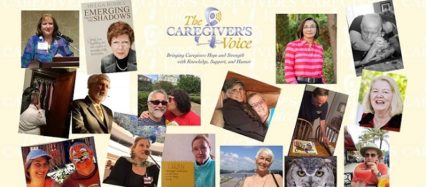The Caregiver’s Voice Reflects on the Voices with Dementia
It’s been more than a year since The Caregiver’s Voice began the VOICES with Dementia column. When we wrote The Caregiver’s Voice will be launching a new column called VOICES with Dementia, we hoped to learn more about caring for people with dementia from those living with dementia. After all, when we gain a deeper understanding of what it means to live with dementia, we can help to reduce the stigma. Imagine how people with dementia feel after hearing people without dementia (PWoDs) say: “I’d rather die than live with dementia.” Worldwide, an estimated forty-seven million people have been diagnosed and live with dementia. Sixteen of them have been featured here. They’ve found ways to overcome the shock of being diagnosed with an incurable disease and are thriving. While they still can speak, if we listen to and heed their words, we will learn a lot. Initially, a diagnosis is devastating, shocking, and tears apart the threads of a family’s tapestry, but dementia is not the end. An early diagnosis allows families to begin planning sooner and take steps to prepare for long-term care. On the other hand, an early diagnosis could mean a misdiagnosis or a life lived with stigma and disqualification for certain insurance benefits. A diagnosis of mild cognitive impairment (MCI) leaves one with a 50-50 chance of developing dementia and prevents qualification for certain disability benefits. Despite the diagnosis, people with dementia are achieving great things from co-founding and leading international organizations to authoring books and speaking around the world to raise awareness of living with dementia. People with dementia don’t look like they have dementia. Family members often notice different behaviors leading up to a diagnosis of dementia. The person with dementia suspects something’s not right, leading to a diagnosis with dementia. A diagnosis adds urgency to living life with purpose. People with dementia are people first. The disease does not define the person. And most don’t consider themselves “Alzheimer’s sufferers.” [TCV Update 2/23/2020 URL no longer available to article] We can add more to the list as we learn from people expressing creative ways to live with dementia. For instance, last September, during Alzheimer’s Awareness Month, Dementia Alliance International published Teresa Zawicki’s creative comparison between living with dementia and solar power. [TCV Update 9/30/2022: URL updated] She writes, “People with dementia are limited to one solar panel with no backup source. No generators. No traditional electricity.” She invites people to help supply power by helping with tasks, allowing her to reserve some of her power. The Alzheimer’s Disease International released a report this year focused on “Improving healthcare for people living with dementia,” Click on the 2016 World Alzheimer Report to open a 2-page overview (pdf) with several highlighted areas (mine). You may be surprised to learn that only a fraction of those living with dementia are diagnosed. In low- and middle-income countries, as many as 90% have not been diagnosed and in developed countries, about half of those who live with dementia remain undiagnosed. The document overviews what we can do, including involving people with dementia when designing flexible care options and healthcare initiatives. People who live with dementia are PEOPLE first whichever form of dementia — Alzheimer’s, Lewy body, vascular, frontotemporal lobe, and more — they live with. By focusing on the PERSON, we improve care and reduce the stigma. Join us in January when we feature our 17th VOICE with Dementia.
